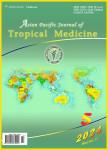Unravelling the situation of malaria misdiagnosis in India:Its adverse impact and management strategies
作者机构:ICMR-National Institute of Malaria ResearchSector-8DwarkaDelhiIndia Indian Council of Medical ResearchNew DelhiIndia
出 版 物:《Asian Pacific Journal of Tropical Medicine》 (亚太热带医药杂志(英文版))
年 卷 期:2022年第15卷第7期
页 面:290-292页
核心收录:
学科分类:1004[医学-公共卫生与预防医学(可授医学、理学学位)] 1002[医学-临床医学] 10[医学]
基 金:Indian Council of Medical Research ICMR
摘 要:Malaria is a public health problem in several parts of India.A continuous decrease in malaria has been reported in India,from about 2.0 million cases in 2000 to about 0.2 million in 2020[1].In February 2016,the Government of India formally launched the National Framework for Malaria Elimination,which outlines the strategies for eliminating malaria from India by 2030[2].It aims to interrupt indigenous malaria transmission(zero indigenous case reporting)throughout the country,prevent the re-establishment of transmission in areas where it has been eliminated,and maintain national malaria-free status by 2030 and beyond,using the existing intervention tools and strategies.In 2017,India launched its five-year National Strategic Plan for Malaria Elimination,which is mainly district focused rather than the National Framework for Malaria Elimination,which was state focused[3].India has shown a 71%reduction of malaria cases in 2019 compared to 2015,which was achieved by strengthening surveillance,improving diagnosis and treatment,and intensive vector control measures using existing tools.In India,Odisha state contributed 37.4%of total malaria cases in 2015,which was reduced to 12%in 2019 using the Durgama Anchalare Malaria Nirakaran initiative and comprehensive case management of malaria[4].



